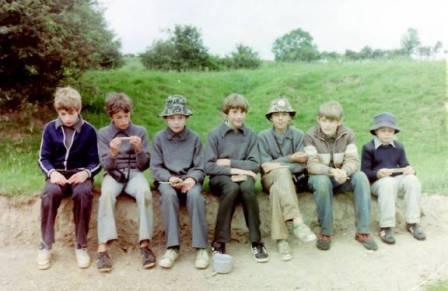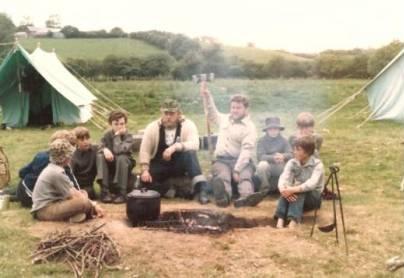Aymestrey School Camp 1982
Tim Prince 1977-82
Camp was the final treat that was in store for us. The ultimate threat made to an Aymestrey School fifth former was that they wouldn’t be allowed to go on Camp, a sentence that was passed only once as far as I am aware. It was in preparation for Camp that we finally discovered that the scout room down at the far end of the cellars was not boarded up but contained a treasure trove of camping equipment including old tents of heavy canvas, large enamel cooking pots and many other useful bits and bobs. We formed a relay and, directed by Mr. Cash, moved all the kit that we would need onto the South Lawn ready to load it into the convoy of parents’ cars that were waiting to take us to our destination, dressed in games kit, of course. Mrs Griffith released packs of bacon, tins of beans and meat, and loaves of bread and cakes from the kitchen which we eyed hungrily as we made a pile of things destined for the ‘store tent’. The rest of the school was allowed out onto the front to watch us leave and wave us off, and then finally we were on the open road and away.
|
Our destination was the Green-Price farm just inside the Welsh border not too far from Presteigne. We were able to use one of their fields some way from the main farm buildings. Along one edge of the field ran a small tree-lined river of cold, clear water, shallow enough to paddle in and with a gravel bottom that was kind on the foot. We pitched our tents on the flat section near to the bank in a semi circle around a fire place still defined by the previous year’s expedition as the rest of the field sloped upwards to end at an old hedge full of gnarled and weather beaten trees and bushes so typical of the area.
|
Both Norman Green-Price (1933-1939) and Simon Green-Price (1972-1977) are Aymestrey Old Boys |
|
Our time away lasted four or five days and Mr. Cash made sure that we were busy from start to finish, although this holiday was not the intense experience that Ru’a Fiola had been but rather a pleasant time to relax and unwind after the pressure of the exams and to enjoy being away from our normal surroundings. We had a competition to see who could fashion the best boat out of wood found lying around in the field and then raced them down the river near the campsite. We took ourselves downstream on the hot days to a wider part of the river where Mr Cash cut turfs with a spade and we created a swimming pool by building a dam with them to raise the water level. It was equally as much fun trying to hold the water back and repairing the dam whenever it was overwhelmed as it was to swim in the resulting pool.
|
Tradition dictated than an assault be mounted on the nearby summit of Radnor Forest at some stage during the week. Not only did we have to climb the mountain but we had to walk to the foot of it first as we had no form of motorised transport with us. Bad weather gear and lunch were packed up in our rucksacks and we set off over fields and along country roads to conquer the mountain, being scared by dogs en route which Mr Cash happily told us happened every year once we had passed the offending homestead. The path up the side took us through dense pine forests infested with millions of flies which buzzed incessantly around our heads, tormenting us into swiping madly with our arms until one by one we accepted the inevitable and just let them swarm around us in a dirty grey cloud. Once clear of the forests we left our blood-sucking passengers behind and made the final approach to the summit over familiar moorland territory, broken by nothing but tiny streams and the odd few sheep.
We arrived back in camp just as the light was beginning to fade, exhausted by the day’s activity, to be revived by delicious Fray Bentos steak and kidney pies cooked still in their tins.
We arrived back in camp just as the light was beginning to fade, exhausted by the day’s activity, to be revived by delicious Fray Bentos steak and kidney pies cooked still in their tins.
One evening we had a visit from two local celebrities, both giant men, one looking like Father Christmas sporting an enormous beard and the other with a jolly round face rather like one of Father Christmas’ elves. They were both countrymen through and through, and soon after their arrival offered us a fire lighting challenge. They would build a fire which we could then soak with as much water as we wanted, and then they would light it within two minutes. Can’t be done, I hear you say, and we all said the same. Nevertheless they quickly built a small stack which was based around a stick frame so that when they had finished they had constructed what looked like a model of an African native hut. We took containers of all sorts, including buckets, and spent five minutes going forwards and backwards to the river soaking it in as much water as possible so that the area around the base became soggy. When we had finished they set to work against a stop watch. They rolled up sheets of newspaper, lit one end and then fed them slowly into the ‘doorway’ of the fire. Somehow or other the shape of the fire both protects the inside from the wind and allows the heat to circulate quickly to dry out the wood, and the rolls of paper allow the right amount of air in to feed the flames rather than extinguish them because the wood caught alight after about a minute and a half. Within the two minutes the whole stack was one great big mass of flames.
Another skill they imparted to us was the construction and use of a camp fire ‘cooking stick’. Taking a long and reasonably thick stick they cut off all the little bumps and twigs, sharpened one end to a point and put a split in the other end some six inches deep. To use this they took some bacon and skewered it onto the sharp end and then half opened a can of beans, rolling the top of the tin over which then sat in the split of the cooking stick, acting as the perfect holder. Both could then be held over the fire, alternately of course, and be cooked to be ready at the same time. When we tried this for ourselves we found that the only hazards were making sure that the cooking stick itself didn’t catch fire and avoiding poking other fire users with hot bacon when turning the stick around.
|
After our evening meal the two men stayed and we all settled around the fire to hear our favourite tales, ghost stories. The bearded man told us a story full of tension and fear, and right at the end, when he was just about to get to the climax and was speaking almost in a whisper so that we were all leaning towards him to hear, he let out an enormous roar. We all rocked backwards and one or two actually fell over, frightened by the noise and the unexpectedness if it. He thought it was very funny and laughed for five minutes whilst we all tried to pull ourselves together.
|
The food on Camp was simple yet delicious. We all did the ‘cooking’ such as it was over the open camp fire and Bod was in charge of tea making, a duty which he discharged with distinction using a large enamel kettle. The great outdoors makes tea taste superb and this tea was no exception, bearing no resemblance to the brew that we were served up back at school. On the first night Mr Cash said that we should keep the leftovers and use them for a stew at the end of the week which I thought sounded a sensible idea and something to look forward to. The only trouble was he suggested the same thing after every meal and, knowing the contents of each remainder I began to have some reservations about what the stew would actually taste like. Thus I was very relieved when he told us that the stew was just an imaginary dish after someone clever questioned him along more intelligent lines that I was capable of, trusting fool that I am. When we got back to school we still told the fourth form about ‘the stew’ and went into great detail about how delicious it had been.
At the end of the week and several wide games and other miscellaneous activities later we packed up Camp and prepared to head back to our last few days at school. When the group of parents arrived they found our kit but we had scattered into the nearby hedgerows, hidden with some part (or all) of our bodies still visible yet camouflaged, and they had to spot us from where they were standing. They failed miserably but then they hadn’t just completed a week of camping, Aymestrey style.

